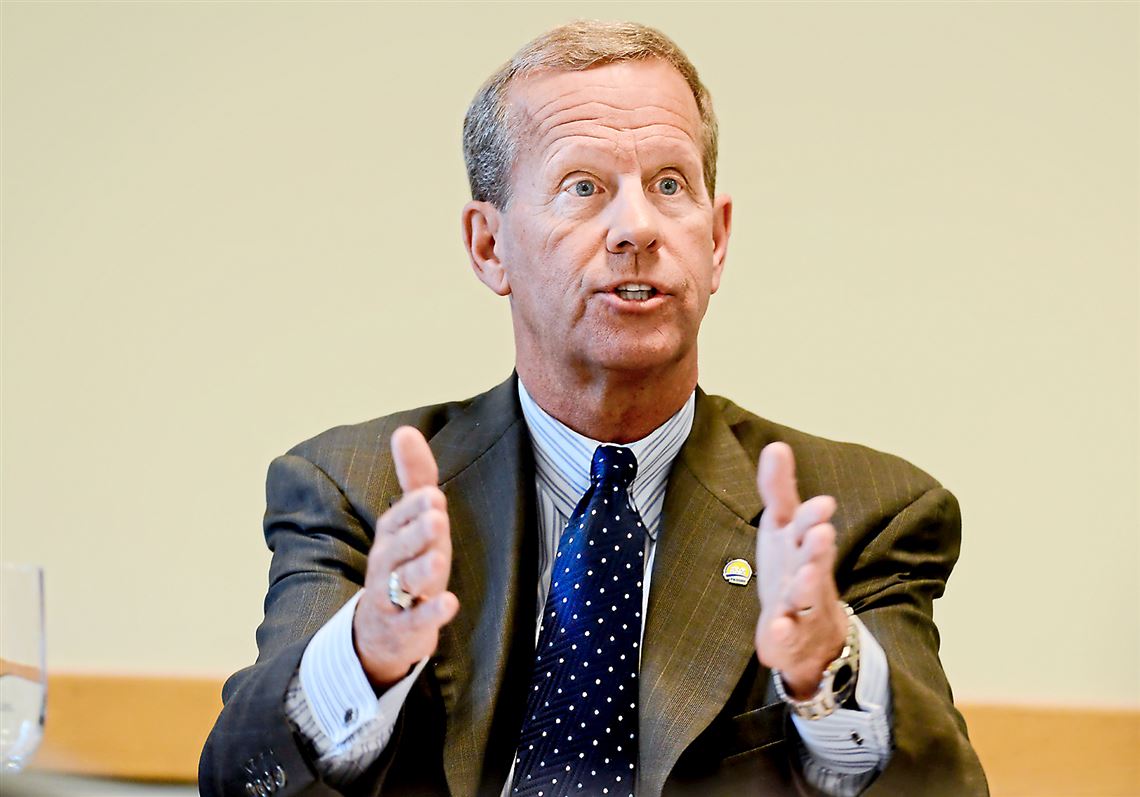Frank Brogan’s departure Friday after nearly four years as State System of Higher Education chancellor apparently will come without regrets — be it over decisions related to the system’s first faculty strike or moves to keep the 14 universities afloat.
In written responses Tuesday to questions, he offered thoughts on the strategic review of the State System and on efforts now underway to seek approval for the more significant changes recommended by a consultant, including a new system governing board and sharing of academic programs by struggling campuses.
It is a policy and political fight Mr. Brogan will not be around to lead.
“I am hopeful that this state has the guts to follow through with changes that need to be made to ensure our system continues to fulfill its mission,” he told the Pittsburgh Post-Gazette via email. “The students we serve and their families are counting on it.”
His responses came nearly six weeks after Mr. Brogan, 63, surprised many by announcing his retirement July 17, days after the National Center for Higher Education Management Systems released its recommendations. Those recommendations, like a subsequent report, have drawn a mix of praise and criticism.
Mr. Brogan, a former Florida lieutenant governor, declined comment on a story posted last week by Education Week. Citing unnamed sources, it said the chancellor was being considered for a Trump administration post, specifically as assistant secretary for elementary and secondary education in the U.S. Department of Education.
Regarding the system’s strategic review, Mr. Brogan said he stands behind the work, even if others have disagreed.
“I can say that so much of the (consultant’s) report is spot on — from the need to refine our governance model and increase university collaborations, to treating our system more like the higher education entity it is and less like a state bureaucracy, and more.”
He defended the NCHEMS report against those who have said it does not offer recommendations that could yield immediate financial relief. He said “the challenges facing our system have developed over decades and will not be solved overnight.”
He also said some recommendations do hold potential for short-term benefit.
For instance, Mr. Brogan said, campuses with the greatest financial need could see “real cost savings sooner rather than later” if leaders adhere to recommendations to share administrative services and even academic programming.
The latter idea already has drawn criticism from some, given the potential for scaled back offerings at those schools and professor cuts.
Asked to summarize his tenure and system successes, Mr. Brogan cited three years of increased state support after years of stagnation and new tools for data-driven decision-making, including a study specific to each region of Pennsylvania on job demand and whether campus programs meet student and employer needs.
He pointed to the strategic review itself. “Perhaps the most important thing we’ve done in the past four years is to initiate an honest, candid and strategic conversation about how this system must transform itself.”
Others have said state support still is lacking and that the system remains unable to respond rapidly enough to market changes driven in part by population losses and state aid levels habitually near the bottom nationally.
Cheyney University, which is insolvent and has lost half its enrollment since 2010, faces a Sept. 1 deadline to provide the agency accrediting it with a plan to cut its $35 million budget by nearly a third, system spokesman Kenn Marshall said.
Other member universities including Clarion, Edinboro and Mansfield are scrambling to recoup six-year enrollment losses ranging from 29 percent to 35 percent.
Mr. Brogan arrived in October 2013, three years into an enrollment slide that by last fall had reached 12 percent across the 105,000-student system. During his tenure, the system’s board of governors approved pricing experiments that generated more revenue but also complaints by some, including the Association of Pennsylvania State College and University Faculties, that students were being priced out of classroom seats.
Mr. Brogan said he believes the changes during his tenure will benefit the system and that the report’s completion represented a logical time for the system and for his family for him to retire. Mr. Brogan shared no specific disappointments or regrets about decisions made either by him or the system board.
“Every decision we’ve made has been focused on our mission to provide Pennsylvanians access to a high-quality, affordable education,” he said. “There could never be regrets in that.”
He offered a similar comment regarding the labor dispute between the system and APSCUF that last October spawned a faculty strike, the first in the system’s 34 years.
“I will leave it to others to decide what could have been done differently, but I can say that the board’s action — which was focused on getting students back into the classroom—was really the only option they had before them.”
In addition to Cheyney, Clarion, Edinboro and Mansfield, the system includes Bloomsburg, California, East Stroudsburg, Indiana, Kutztown, Lock Haven, Millersville, Shippensburg, Slippery Rock, and West Chester Universities of Pennsylvania.
Bill Schackner: bschackner@post-gazette.com, 412-263-1977 and on Twitter: @BschacknerPG.
First Published: August 30, 2017, 12:00 p.m.
Updated: August 30, 2017, 3:34 p.m.


















